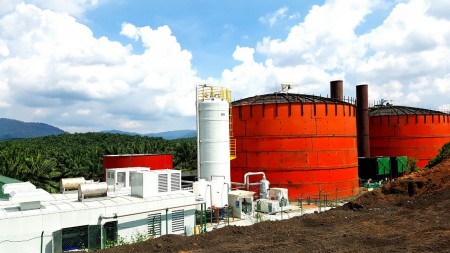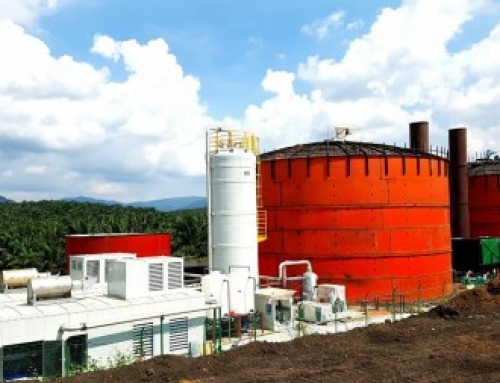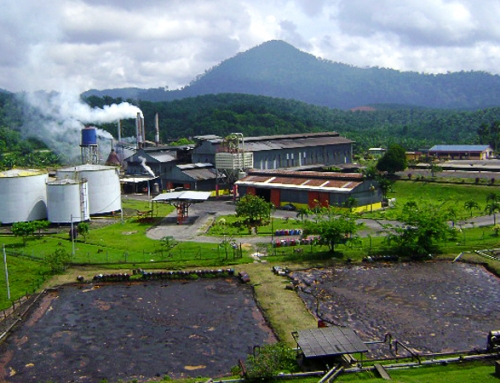The most recent update (4 January 2018) from Green & Smart Holdings, the renewable energy group that produces biogas from waste in Malaysia says they are excited by the progress on their second fully-owned biogas power project. You do not have to look too far into G & S’s recent history to discover why, even though they also say revenues for 2017 have been hit by funding constraints.
In May 2016 G & S achieved a listing on London’s AIM having first consolidated various subsidiaries and minority holdings into Green & Smart Holdings. Green & Smart started out as a company involved in waste water treatment in rubber plantations. Today its core activity is capturing biogas from palm oil mill effluent (POME). It plans to become a major player in this field. Energy from POME is very big business in Malaysia just now and could grow exponentially. The company is reported to have had 33.3 per cent of the 112.5MW of Feed-in Tariff approved capacity that was due to come on stream between 2015 and 2017, the largest industry share, and Malaysia is targeting at least a further 112.2MW by 2020. Power from G & S’s POME Plants will be covered by the company’s 16= year feed in tariff (FiT) contract and sold to Malaysia’s national grids.
G&S’s Pre-AIM flotation reorganisation means not only will they have their own core POME business, they have also invested in two other Malaysian green companies involved in waste management—Megagreen Energy (MGE), where there is a 15 per cent stake and Concord Green Energy (CGE), in which G & S has 25 per cent of the action. The group will operate two business models for these energy plants, build own and operate (BOO), and engineering, procurement, construction and commissioning (EPCC.)

Green & Smart believe that biogas plants from palm oil mill effluent (POME) will proliferate in Malaysia
Historically, G&S has operated as an EPCC company designing and building projects for other owners including palm oil mill owners. This has meant good relationships with major mill owners in the country. EPCC contracts continue to be prominent. In a projects update issued on 26 August 2017 the company said that since consolidation, Megagreen Energy had completed biogas under EPCC contracts with 6MW of total capacity. It added that Concord Green Energy has an existing EPCC pipeline of at least another 10 biogas plants with contracts for 12.5MW of capacity.
EPCC contracts are not to be sneezed at but they do mean G & S could face a lumpy and uncertain earnings stream. While EPCC projects will contribute to up front earnings, once completed the only long-term earnings stream is under the 16-year long term operations and maintenance (O & M) contracts for each project. This helps but does not remove the lumpiness of the earnings pattern.
Cantor Fitzgerald, house broker at the time, commented on the interim results for the six months ending to March 31, 2017, which were released on June 22, 2017, saying that revenue was 18 per cent up to RM 25.8 million (£4.6m), gross profits were 3 per cent to the good at RM6.9m (£1.2m) but profits before tax (PBT) fell 21 per cent to RM3.8m. Cantor Fitzgerald intimated that although G & S has outstanding receivables of RM76m related to MGE and CGE these monies probably will be paid in financial year 2017-2018. This is the reason for the poor PBT performance.
Alternatively, if G&S develops projects under a BOO model, there is no immediate income until such time as projects are completed and generating cash flows. These cash flows can be considerable. A former house broker SP Angel says the margins on these plants is high – biogas power generation plants at a mill are typically 2MW in size and cost RM14m (£2.6m) to build with construction and connection to the national grid taking just under 12 months. The brokers model is a 2MW plant producing annual electricity sales of RM7.3m (£1.3m), which should generate a net profit of RM3.5m (£0.6m)—this is a 47 per cent margin. The broker says the payback period is just over 3 years.
Accordingly, G&S is clearly pleased with the progress it is making with its own BOO schemes. The company’s first fully-owned plant, the 2MW Kahang biogas plant in Johor which was commissioned in early 2017 is generating power that is being sold to the national utility at the full tariff rate. The second fully-owned project, the Malprom biogas plant in Penang, was expected to have received full certification and be selling power to the national utility by the end of January 2018.
The company says that it continues to focus on securing long term financing facilities from local finance providers. G&S said in January that due to financing constraints it expects to report revenue for the year to 30 September 2017 to total around RM45m, down from RM67m the year before. The share price for the £17.98m company was 6.12p last night against a 12-month high of 10.5p and a low of 5.94p.


